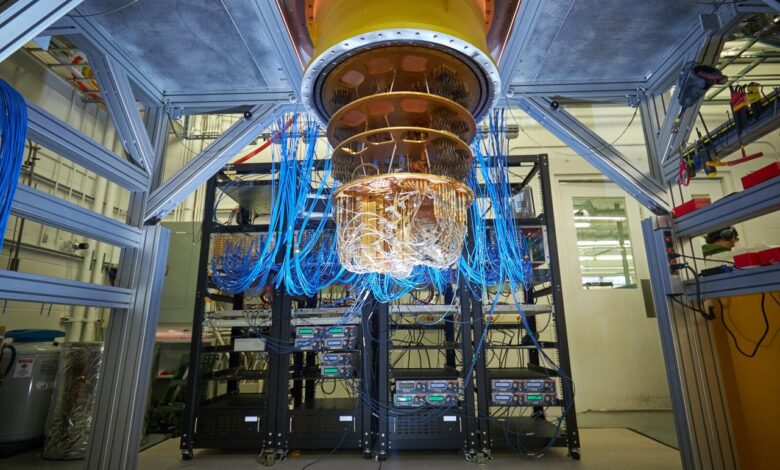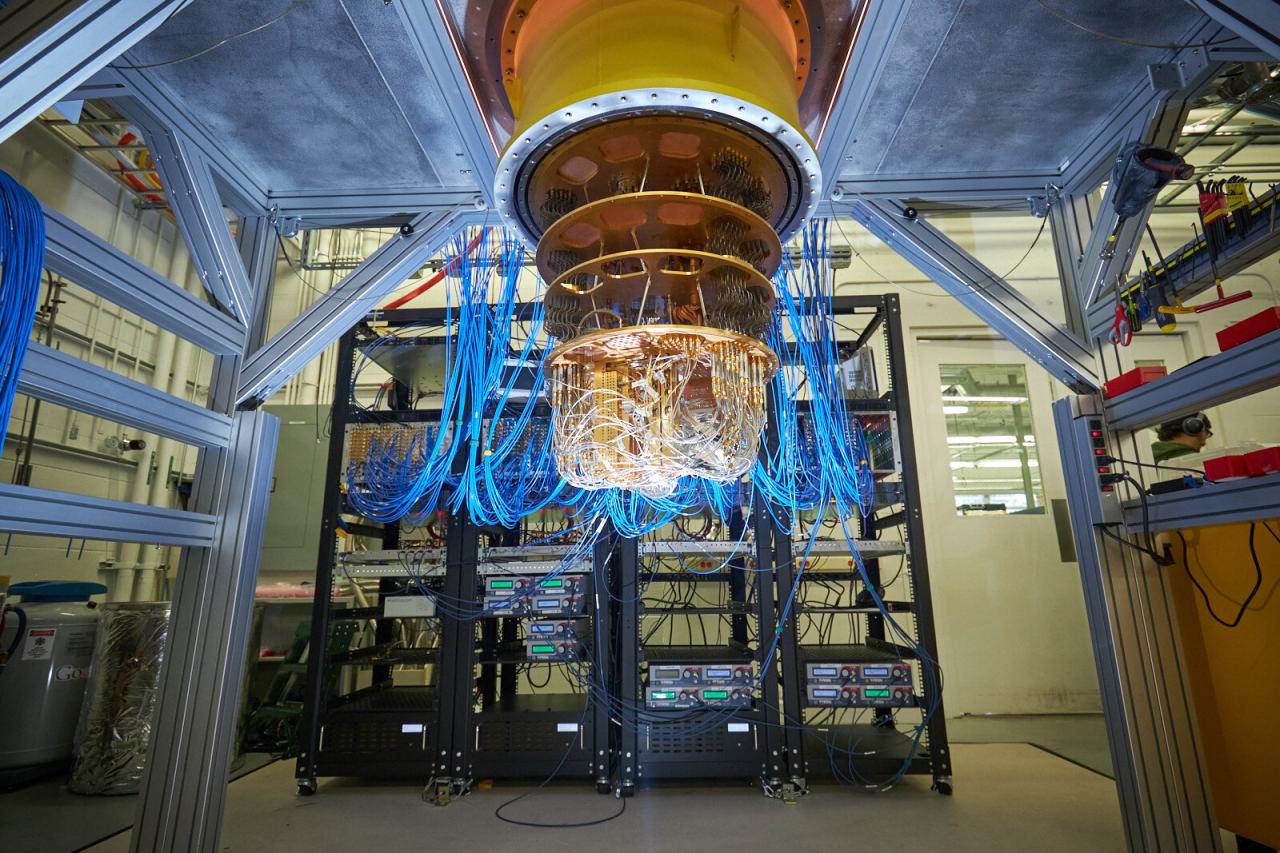Next Frontier Tech: Quantum, Bio, and Space Exploration

The world is perpetually on the brink of profound technological shifts, but the current era is witnessing the simultaneous convergence of several seemingly futuristic innovations that promise to fundamentally redefine human capability and existence itself.
We’re moving far beyond the digital realm defined by the internet and smartphones, now standing at the exciting threshold of entirely new scientific frontiers that promise to solve grand challenges in medicine, climate change, and computational power.
This impending era, often dubbed the Fifth Industrial Revolution, will harness the bizarre rules of quantum physics and the deep complexities of biological engineering, alongside the relentless pursuit of interstellar travel, transforming every industry from healthcare to finance.
Understanding these groundbreaking, “next frontier” technologies is critical because they represent the next trillion-dollar markets and the potential solutions to the most pressing global problems facing humanity, demanding not only scientific rigor but also profound ethical and philosophical consideration.
The speed at which these fields are developing—fueled by advances in Artificial Intelligence and massive data processing—suggests that once-impossible dreams like ultra-fast computation, personalized cellular therapy, and even permanent space colonies may become tangible realities sooner than anyone anticipates.
Prepare to take a fascinating deep dive into the innovations that are actively shaping the world of tomorrow, where the laws of nature are being bent and biological limits are being challenged.

The Quantum Computing Revolution: Beyond Classical Limits

Quantum Computing is arguably the most disruptive technological advancement on the horizon, promising to solve problems that are utterly intractable for even the world’s most powerful conventional supercomputers. Unlike classical computers that use bits (which are either 0 or 1), quantum computers use qubits to perform calculations.
1. Understanding the Quantum Advantage
The power of quantum computing comes from two principles of quantum mechanics.
A. Superposition
- A classical bit must be in a definite state of 0 or 1.
- A qubit, thanks to superposition, can exist as both 0 and 1 simultaneously.
- This allows a quantum computer to process many different combinations of information concurrently.
B. Entanglement
- Entanglement is a strange quantum phenomenon where two qubits become linked, or correlated, regardless of the physical distance between them.
- Measuring the state of one entangled qubit instantaneously influences the state of the other.
- This allows the quantum computer’s processing power to scale exponentially, making it capable of simultaneous computations that classical machines cannot replicate.
2. Quantum Computing’s Transformative Applications
Quantum computers won’t replace your laptop, but they will revolutionize specific, high-complexity fields.
A. Drug Discovery and Materials Science
- Quantum simulation can model the precise behavior of molecules and chemical reactions with perfect accuracy.
- This will radically accelerate the discovery of new drugs, therapies, and vaccines by allowing researchers to virtually test billions of compounds.
- It will also facilitate the design of new materials, such as more efficient solar cells, revolutionary battery components, and ultra-light alloys.
B. Financial Modeling and Optimization
- Quantum algorithms can solve incredibly complex optimization problems with unprecedented speed.
- This includes optimizing vast global logistics and supply chain networks to find the single most efficient route.
- It will also be used in financial services for highly sophisticated risk analysis and fraud detection across complex investment portfolios.
C. Cryptography and Security
- Shor’s Algorithm, a theoretical quantum algorithm, is capable of factoring massive numbers quickly.
- This poses an existential threat to nearly all current public-key encryption methods, which rely on the mathematical difficulty of factoring large numbers.
- The development of Post-Quantum Cryptography (PQC) is now a critical, global race to create new, quantum-safe encryption standards before a functional quantum computer emerges.
Biotechnology and Genetic Engineering: Reshaping Life
Biotechnology harnesses cellular and biomolecular processes to develop technologies and products that improve human health and the planet. This field is being revolutionized by the precision of gene-editing tools.
1. The Power of Gene Editing (CRISPR)
The discovery of the CRISPR-Cas9 system has provided scientists with an unprecedented level of precision in manipulating DNA.
A. Mechanism of CRISPR
- CRISPR acts like a highly precise molecular “pair of scissors” that can be programmed to cut DNA at specific points within the genome.
- This allows scientists to easily edit, remove, or replace faulty or undesirable genetic sequences responsible for inherited diseases.
- The simplicity and low cost of CRISPR have democratized genetic engineering, accelerating research globally.
B. Revolutionary Medical Applications
- Curing Genetic Diseases: CRISPR is already being trialed to correct the genes responsible for debilitating inherited conditions like sickle cell anemia and cystic fibrosis.
- Cancer Therapy: It can be used to engineer a patient’s own immune cells (CAR T-cell therapy) to make them more effective at identifying and destroying cancer cells.
- Personalized Medicine: Genetic sequencing combined with AI allows for highly personalized treatments based on an individual’s unique biological makeup.
2. Synthetic Biology and Bio-Manufacturing
Synthetic biology aims to design and construct new biological parts, devices, and systems that do not exist in the natural world.
A. Designing New Organisms
- Scientists are engineering microbes, like yeast and bacteria, to function as tiny “biological factories.”
- These engineered organisms can be programmed to produce sustainable biofuels, pharmaceuticals, and complex chemicals more cheaply and efficiently than traditional methods.
B. Regenerative Medicine
- This field focuses on creating functional human tissues and organs to repair or replace damaged ones.
- Advances include 3D bioprinting, which uses a patient’s own cells to print personalized skin grafts or even miniature organs (organoids) for drug testing.
- The ultimate goal is to eliminate the need for organ donors and treat massive injuries or degenerative diseases.
Space Exploration and Commercialization: The New Frontier
Once the sole domain of government agencies, space is rapidly becoming commercialized, driven by private companies with ambitious plans for exploration and resource utilization.
1. Commercial Access to Low Earth Orbit (LEO)
Private aerospace companies have drastically reduced the cost and time required to access space, accelerating research and development.
A. Reusable Rockets
- Innovations in reusable launch systems have dramatically reduced the cost of launching payloads and people into orbit.
- This has opened the door for private investment in space-based services and manufacturing.
- The increased cadence of launches is essential for building the next generation of global communication and observation satellites.
B. Private Space Stations
- Private companies are developing and launching their own commercial space stations to replace the aging International Space Station (ISS).
- These facilities will serve as orbiting labs for microgravity research, manufacturing specialized materials (like fiber optics), and space tourism hubs.
2. Mars Colonization and Deep Space Travel
The ultimate human goal is to establish a permanent, self-sustaining presence on another celestial body.
A. Interplanetary Systems
- Companies are developing the massive, fully reusable rockets needed for long-duration deep space missions to Mars and beyond.
- Research is focusing on closed-loop life support systems and in-situ resource utilization (ISRU) to allow colonists to live off the land.
B. Asteroid Mining
- Asteroids contain vast, untapped reserves of rare and valuable metals (like platinum and gold) and resources (like water ice).
- Technologies are being developed for robotic missions to survey and eventually mine these resources, potentially injecting trillions of dollars into the space economy.
The Convergence of Technology: Ethics and Impact

The most profound changes will occur where these three major fields—Quantum, Bio, and Space—intersect, but this power comes with immense responsibility.
1. The Ethical Imperatives
The ability to manipulate the very building blocks of computation and life demands proactive ethical governance.
A. Genetic Equity and Access
- There is a risk that gene-editing technologies could become available only to the wealthy, leading to genomic inequality where only the rich can afford to eliminate hereditary diseases.
- Ethical guidelines are urgently needed to prevent the use of gene editing for “enhancement” (designer babies) rather than strictly for medical therapy.
B. AI and Quantum Safety
- The emergence of a quantum computer capable of breaking current encryption requires immediate, coordinated global migration to Post-Quantum Cryptography.
- The use of advanced AI in synthetic biology raises complex safety questions about the creation and potential release of novel, engineered organisms.
2. Societal and Economic Transformation
The impact of these fields will change the structure of the economy and human identity itself.
A. Hyper-Specialization of Jobs
- New careers will emerge at the intersection of fields, such as quantum machine learning engineers and synthetic biology data analysts.
- The workforce will require massive investment in re-skilling programs to handle these highly specialized, data-intensive roles.
B. Economic Disruption
- Quantum capabilities will disrupt sectors like finance and logistics almost overnight, giving enormous competitive advantages to early adopters.
- Bio-manufacturing will dramatically change supply chains, allowing production of complex materials to shift from factories to bio-reactors.
Conclusion
The journey into quantum computing, biotechnology, and space marks humanity’s next great era.
Quantum technology promises to unleash computational power that defies classical imagination.
Genetic engineering offers the miraculous potential to cure diseases once considered inevitable.
Space commercialization is rapidly transforming the vacuum of orbit into a new zone of commerce.
These technologies are converging to create solutions for climate, health, and global efficiency.
The immense power of these tools demands a profound commitment to ethical development and equity.
Policymakers must collaborate globally to ensure responsible governance and widespread access to these benefits.
We are currently witnessing the birth of industries that will define the economy for the next century.




